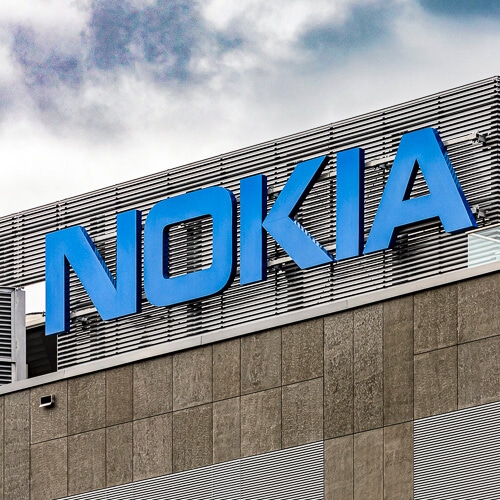
Nokia has attempted to generate a bit of a buzz about its recent efforts in the field of 5G patents, boasting that it has now reached a new milestone of 4,000 patent families "declared as essential to 5G standards."
The Finland-based vendor also pointed out that it has invested €130 billion in research and development since 2000, and said its patent portfolio contains around 20,000 patent families – where each patent family consists of multiple individual patents.
Jenni Lukander, president of Nokia Technologies, which is the vendor's unit dedicated to licensing, also declared that "the work does not stop there. Our focus is on innovating for the future. Driving the development of the next generation of cellular standards and enabling entire industries to build upon our inventions."
Figure 1:  Patently necessary: The Finnish vendor says it now has 4,000 patent families essential to 5G standards.
Patently necessary: The Finnish vendor says it now has 4,000 patent families essential to 5G standards.
(Source: Paweł Czerwiński on Unsplash)
Nokia has been on a bit of a mission to claim a leading role with essential 5G patents. Back in April, the vendor said independent analyst firm PA Consulting had again concluded that Nokia is number one for ownership of granted patents that the researchers found essential to 5G standards.
Notably, the total tally has remained broadly the same at around 20,000 despite the increase in 5G patent families in recent months.
As a Nokia spokesperson explained, the vendor files patents on new inventions all the time – over 1,500 last year, for example. However, it relinquishes patents that no longer generate value while patents also expire after a certain number of years.
Patents race
Nokia is careful to make clear that the patents it is counting here are deemed "essential to 5G standards." Indeed, in telecom, with the biggest IP owners relying on cross-licensing, the industry measures standards-essential patents (SEP) to determine market leadership.
However, a quick glance at analysis by patent research specialists suggests that it is no easy task to determine who is leading in the 5G patent race.
As well as PA Consulting, one group that has regularly made attempts to identify essential 5G IP is research firm IPlytics. It does so by integrating all European Telecommunications Standards Institute (ETSI) declared patents and matching these to the 3GPP standards database, among other factors.
In November 2021, IPlytics found that Huawei was the leader in terms of 5G portfolio shares, which includes granted patents as well as pending applications at all worldwide patent offices.
The China-based vendor was deemed to have a share of 13.52%, followed by Qualcomm with 9.97%, Samsung with 9.94%, ZTE with 9.83%, LG Electronics with 9.04%, Nokia with 8.34%, Datang with 5.03%, and Ericsson with 4.69%.
However, IPlytics notes that the 5G patent family statistics are not based on verified SEP families. In a previous report in February, it noted that this means that the 5G patent families presented "are only potentially essential. Many well-known SEP studies estimate that between 20% and 30% of all declared patents are essential," the company said at the time.
When applying an "essentiality rate" to the ownership shares in February, it was found that Samsung was in the lead for 5G patent ownership, followed by Nokia and Qualcomm. However, this calculation does not appear in the November report.
IPlytics does note that in terms of technical 5G contributions that have gone into the 3GPP 5G standard, Huawei has the highest number of approved contributions, followed by Ericsson and Nokia.
"These three companies are by far the strongest contributing 5G standards developers, followed by Qualcomm, Samsung and ZTE," IPlytics said.
No FRANDs here
IPlytics also points to the likelihood of increased 5G SEP litigation in the coming years, as the use of 5G spreads beyond smartphones and into the automotive sector, manufacturing, home appliances, energy, healthcare, and beyond.
However, the licensing of SEPs in these industries "is still something of an unknown factor."
IPlytics said SEP-related global royalty income in 2020 was estimated at $20 billion, yet market researchers foresee a strong increase in the compound annual growth rate of royalty income over the upcoming years due to the wide implementation of 5G beyond smartphones.
Want to know more about 5G? Check out our dedicated 5G content channel here on Light Reading.
"Experts, however, anticipate that the industry will not always align on FRAND rates for 5G SEPs," IPlytics said – in what could be regarded as something of an understatement given ongoing disputes over licensing of essential patents on terms that are fair, reasonable and non-discriminatory.
"It is expected that most patent holders will actively monetize and enforce their SEP portfolios covering connectivity standards in this fast-moving, high-investment environment. Negotiating and operating in a complex SEP environment will be a major challenge for 5G adopters," the research firm said.
Related posts:
— Anne Morris, contributing editor, special to Light Reading
Read more about:
EuropeAbout the Author(s)
You May Also Like











